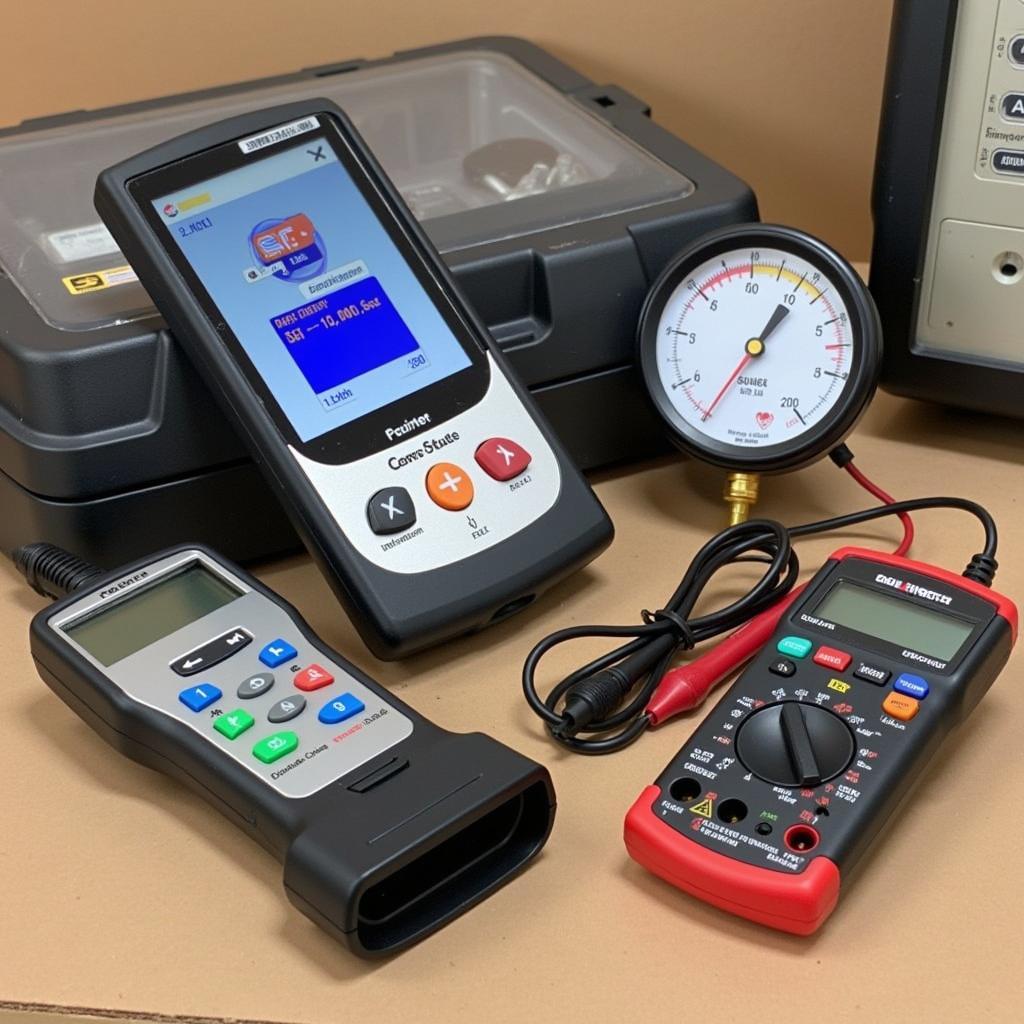Finding the right heavy duty truck diagnostic tools without breaking the bank can be a challenge. Whether you’re a seasoned mechanic or a truck owner looking to DIY, having reliable diagnostic tools is crucial for identifying and troubleshooting issues quickly and efficiently. This guide will explore the world of affordable heavy duty truck diagnostic tools, covering everything from essential features to factors to consider before making a purchase.
Understanding Your Needs
Before diving into the specifics of diagnostic tools, it’s crucial to assess your individual needs:
- Vehicle Types: Determine the specific makes and models of heavy duty trucks you’ll be working on. Some tools are designed for specific manufacturers, while others offer wider compatibility.
- Diagnostic Needs: Are you primarily focused on engine diagnostics, ABS systems, transmissions, or a combination of systems? Identifying your needs will help you narrow down the tool features that are most important to you.
- Budget: Set a realistic budget for your diagnostic tool purchase. Prices can range significantly, so having a clear budget in mind will guide your decision-making process.
- Skill Level: Consider your level of technical expertise. Some tools cater to beginners with user-friendly interfaces and guided diagnostics, while others offer advanced functionality for experienced technicians.
Types of Heavy Duty Truck Diagnostic Tools
 Budget-Friendly Diagnostic Tools
Budget-Friendly Diagnostic Tools
The market offers a wide array of heavy duty truck diagnostic tools, each with its own strengths and limitations. Here’s a breakdown of common types:
1. Code Readers
Code readers are entry-level diagnostic tools that retrieve and display diagnostic trouble codes (DTCs) stored in a vehicle’s electronic control unit (ECU).
Pros:
- Affordable and widely available.
- Easy to use, even for beginners.
- Helpful for identifying basic issues.
Cons:
- Limited functionality beyond reading and clearing codes.
- May not provide detailed code definitions or troubleshooting information.
2. Scan Tools
Scan tools offer more advanced functionality compared to code readers. They can read and clear codes, display live data streams from various sensors, perform bi-directional controls (actuating components), and may include additional features like DPF regeneration and injector coding.
Pros:
- More comprehensive diagnostic capabilities.
- Access to live data for real-time monitoring.
- Often compatible with multiple vehicle makes and models.
Cons:
- Can be more expensive than code readers.
- Some advanced features may require a subscription or additional software.
3. Manufacturer-Specific Tools
For in-depth diagnostics and programming of specific truck brands, manufacturer-specific tools are essential. These tools are designed to interface seamlessly with the vehicle’s proprietary systems.
Pros:
- Unmatched diagnostic capabilities for a specific brand.
- Access to advanced functions like module programming and coding.
- Often used by dealerships and specialized repair shops.
Cons:
- Typically the most expensive option.
- Limited or no compatibility with other truck brands.
Key Features to Look For
When choosing heavy duty truck diagnostic tools, consider these essential features:
- Vehicle Coverage: Ensure the tool supports the makes, models, and model years of the trucks you intend to diagnose.
- Software Updates: Regular software updates are crucial for compatibility with newer vehicles and to access the latest features and bug fixes.
- Data Logging and Playback: The ability to log and playback data can be invaluable for diagnosing intermittent issues.
- User Interface: A user-friendly interface with intuitive menus and clear navigation enhances usability.
- Durability: Opt for tools built to withstand the demanding environment of a repair shop or garage.
- Technical Support: Access to reliable technical support can be invaluable when encountering challenges.
Making the Right Choice
“Investing in the right diagnostic tool is essential for any heavy duty truck owner or mechanic,” says John Miller, a veteran diesel mechanic with over 20 years of experience. “It can save you time, money, and headaches in the long run by enabling you to accurately diagnose and repair issues.”
To make an informed decision, research different brands, read online reviews, and compare features and prices. Consider factors like warranty coverage, customer support, and the availability of training materials.
Conclusion
Choosing the right cheap heavy duty truck diagnostic tool requires careful consideration of your needs, budget, and technical expertise. By understanding the different types of tools available and the key features to prioritize, you can make a wise investment that will pay dividends for years to come.
Need help finding the perfect diagnostic tool? Contact the experts at ScanToolUS at +1 (641) 206-8880 or visit our office at 1615 S Laramie Ave, Cicero, IL 60804, USA.
FAQs
1. Can I use a car diagnostic tool on a heavy duty truck?
While some car diagnostic tools might work on certain heavy duty truck systems, it’s generally recommended to use tools specifically designed for heavy duty trucks to ensure compatibility and accurate diagnostics.
2. Do I need a manufacturer-specific tool?
Manufacturer-specific tools are essential for in-depth diagnostics and programming of specific truck brands. However, if you’re working on a variety of brands, a multi-brand scan tool might be a more versatile option.
3. How often do I need to update my diagnostic tool’s software?
Software updates are typically released periodically to ensure compatibility with newer vehicle models, add new features, and fix bugs. It’s recommended to update your tool’s software as updates become available.
4. What are some reputable brands of heavy duty truck diagnostic tools?
Some well-regarded brands in the industry include Autel, Launch Tech, NEXIQ, and Snap-on, among others.
5. Can I learn to use these tools myself, or do I need professional training?
Many diagnostic tools come with user manuals and online resources to guide you. However, for advanced functions and to gain a deeper understanding of vehicle systems, professional training courses are highly recommended.
